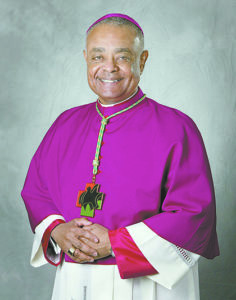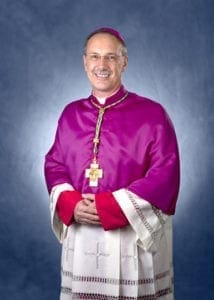Georgia Bishops Articulate Immigration Stance
Published March 3, 2011

Archbishop Wilton D. Gregory
Five years ago, we, the Catholic bishops of Georgia, issued a pastoral statement voicing our heartfelt concerns about the human suffering arising from inhumane national and state policies affecting immigrants. Since that time, the destructive climate affecting the day-to-day struggles of our immigrant brothers and sisters in Georgia seems to have further deteriorated. The Georgia General Assembly must be part of the solution to these challenges, not create more division.
We, and our brother bishops throughout the United States, continue to call for comprehensive, family-based, federal immigration reform for those seeking the same opportunities for their families that were the dream of our own immigrant ancestors.
Sacred Scripture teaches that all human beings are created in the image and likeness of God, that we are redeemed by Jesus Christ and that we are called to share the burdens of others. Scripture demands special concern for aliens, strangers and others who are vulnerable.

Auxiliary Bishop Luis R. Zarama
Catholic social teaching is clear that persons have the right to find opportunities in their homeland but, when economic necessity or political upheaval ensues, they be given the opportunity to migrate in support of themselves and their families. Sovereign nations have the right to control their borders, but refugees and asylum seekers should be afforded protection. The human dignity and human rights of undocumented immigrants should be respected at all times, whether they are at work, at home, at school or participating in community life.
We recognize that some people may have entered the United States in violation of border crossing laws and that certain individuals have overstayed their visas. However, these people do not deserve harsh treatment as major criminals. As pastors, we find it unacceptable that children are separated from their parents and families, or begin each morning wondering if this is the last day they will see their mother or father or siblings.
While they clean our homes and hotels, pick and prepare our food and care for our children and landscaping, many undocumented people continue to live in the shadows without basic security and other human rights. Despite the fact that many have federal and state payroll taxes withheld from their earnings and that all pay sales and other taxes, they know that being the victim of a crime or traffic accident may lead to their arrest and deportation.
For most of these people there is no “line” to stand in or “papers” to sign because our broken immigration system allows for no possibility of their legal entry to the United States. In recent years everyone has realized that our country’s immigration system is broken and the federal government has the primary constitutional responsibility for reform.
We support the U.S. Constitution, which specifically delegates the decisions on all matters that affect U.S. foreign policy and naturalization, including immigration, to our federal government, preventing a patchwork of inconsistent state positions on immigration and naturalization issues, which undermine both our national security and our neighborhoods.

Bishop J. Kevin Boland
People of good will may disagree as to how the reform can be accomplished, but we cannot achieve lasting reform, nor can we make positive strides toward resolving our immigration crisis, until our public discourse focuses on solutions, not personal attacks on those who provide basic support to our society.
In continuing to call on our congressional delegation to support comprehensive immigration reform, we urge our Georgia state representatives to resist the imposition of harsh and unnecessary legislation affecting all residents of Georgia, further tearing apart the fabric of our communities and jeopardizing our future.
We reiterate our call to the members of the Georgia General Assembly, to our Catholic constituents and to all people of good will to speak out in support of comprehensive, federal immigration reform legislation consistent with the values of faith and family that we profess.